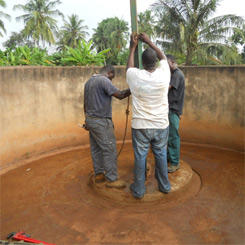
Humanitarian and Development
Place
Liligodo, Togo
Sponsor
Damien Racle
Grant
€54,000 to the Selection Committee at 2011/10/20
Project leader
Solidarité Humaine Île-de-France (SH IdF)
"I'm well acquainted with Solidarité Humaine Île-de-France, based in the territory of the Urban Community of Mantes en Yvelines, with whom we have many contacts. The serious and motivated team has selected a suitable methodology and resources capable of guaranteeing the success of the project, both technically and economically."
Damien Racle
The nonprofit Solidarité Humaine Île-de-France (SH IdF) recognized to be of general interest, is the French affiliate of a Togolese NGO. It has been active since 1999 in the Prefecture of Zio, first in the county seat of the canton of Gbatopé, as part of decentralized cooperation with the Town Hall of Rosny-sur-Seine, and then on the Liligodo zone, which contains another 16 villages of Gbatopé. Its action can be described in four keywords: outreach, responsibility, democracy, liberty. In this setting, it works with village communities, particularly with their representatives in the absence of effective decentralization, the Comités Villageois de Développement (CVD - Village Committees for Development), with respect for the authorities and the laws of Togo. CVDs organized a federative structure in 2004, the Federation of Village Committees for Development (FCVD) of Liligodo, which handles all aspects common to the 17 villages of the area, just like an urban community in France. The projects, based on development plans which express the needs and priorities of the local populations, are implemented with the technical, methodological and financial support of SH IdF, thanks to the mobilizing of their own resources and various lenders.
A development program structured over several years
The nonprofit first focused its efforts on health (construction of a primary health center and community pharmacies) and on education (construction and equipment of several classrooms at all levels, creation of the first maternal school in the area). It then decided to improve the conditions of economic development, with the rehabilitation of trails to open up the villages to the exterior, the construction of a multipurpose training center and a cantonal market, with the financial backing of the French Ministère du Développement Solidaire, the General Council of Yvelines, the Regional Council of Île-de-France, and the substantial participation of the Togolese Development Ministry at the base. The third phase of the existence of SH IdF (2011-2013) is concerned with access to drinking water and sanitation.
Sustainable access to drinking water
SH IdF has set the target of providing sustainable access to drinking water and sanitation for eight villages (or about 15,000 inhabitants) in a difficult situation, also in Liligodo. The projects provide for the creation of boreholes or the rehabilitation of existing wells, the construction of a water tower plus several standpipes per village. According to the model selected by the rural water policy in Togo, borehole management is delegated by the Village Committee for Development to a private individual by a concession contract. A technician is recruited by FCVD for regular maintenance of the boreholes for all the villages.
Turnkey hygiene and recycling
The traditional dumps are replaced by facilities that prevent runoff and seepage, and source-selection is installed to promote waste upgrading (compost, recovery of metals) or its treatment if it is toxic (mainly batteries). The collection/treatment system is delegated by the CVD to an individual trained to perform these tests and paid by the sale of the recycled products. Awareness-raising actions, run by the Community and based on the experiments of Unicef in various countries, involve neighborhood animation without taboos, aimed to teach the village population about the link between the hygiene of their environment and their health. Families wishing to build latrines then receive technical and financial assistance for their construction, with all the health guarantees.
The project began in January 2011 for a three-year period, from the completion of a "pilot" water point functioning in the village of Yobomé, to the choice of a deputy prime-contractor water engineer, and including an awareness raising program conducted by the Togolese NGO Regard sur Demain, the signature of village protocols and the approval of the Regional Directorate of Water and Sanitation to rehabilitate the existing wells. It enjoys financing from the Agence de l'eau Seine Normandie, the Urban Community of Mantes en Yvelines, the Suez Environnement Foundation, the Poweo Foundation... and the Veolia Foundation, which is also investing in the form of its sponsorship of skills, via Veoliaforce volunteers, to accompany its proper technical implementation.

